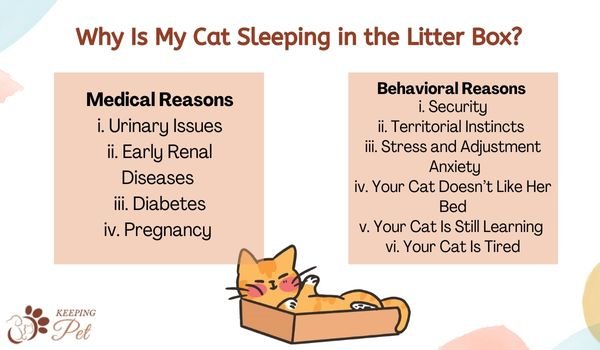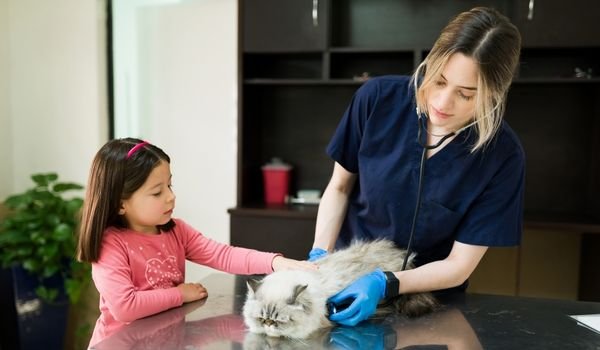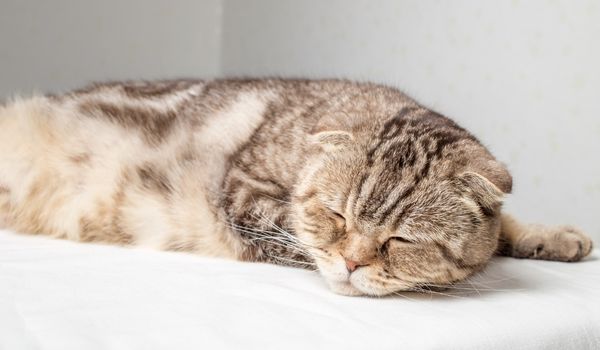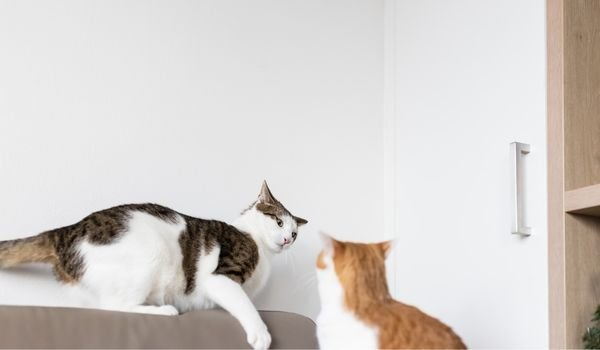Cats are fun and inquisitive. You will find them lounging in places as far from their reach as the ceiling and as odd as the litterbox.
Sometimes, it is fine for a cat to sleep in the litter box. But if it is too often and if it becomes a habit, it is a red flag. Cats sleeping in the litterbox may be due to three reasons:
- Nothing wrong—she is just trying to have fun with the litterbox
- Medical reasons—there is something wrong with her health
- Behavioral reasons—something recently has changed her behavior.
Below, we are going to discuss all the possible reasons in detail. But before we get there, remember that only your vet could have a definite answer, especially when the behavior stems from a health issue.
Medical Reasons Behind a Cat Sleeping in the Litterbox
Cats not using the litterbox and cats spending so much time there that they fell asleep both could possibly be due to underlying medical reasons. Especially when it is a house cat—that is, cats that are kept as pets, unlike those in hospitals or animal shelters. Before dwelling upon behavioral reasons, we first need to rule out medical issues.
i. Urinary Issues
The first and most likely reason could be urinary tract infections, crystal formation, or stones in your cat’s bladder. Infection in the urinary tract can inflame the bladder’s lining to the point that even a drop of urine passing through the tract becomes painful for cats. Similarly, crystals or bladder stones in the urethra could also obstruct the urine, especially in male cats.
This means that your cat has to spend more time in the litterbox. They want to eliminate, but the urine is not coming out, urging them to be in the litterbox for longer periods or more frequent visits. A stone in the bladder that has obstructed the urine makes the whole urination process extremely painful for cats.
If the blockage is full, it will become a life-threatening problem within 48 hours. Take your cat to your vet or a 24-hour emergency hospital right away to diagnose the actual issue.
ii. Early Renal Diseases
Another possible reason that demands immediate attention is renal diseases, which are more common in senior cats. It may not necessarily mean kidney failures but could range from anything minor to chronic kidney disease. As per PetsWebMD, frequent urination is one of the earliest signs of kidney failure. “While you might think this is a sign your cat’s kidneys are working well, it actually means they are no longer able to hold water,” they write.
When you find your cat more often in the litterbox, take her to the vet. They will do blood and urine tests, X-rays, ultrasound, or even biopsy if needed to make a diagnosis and pinpoint the cause. If the issue is found, the treatment may range from surgery to different forms of medication.
iii. Diabetes
Diabetes mellitus could be another medical cause of your cat sleeping in the litterbox. In diabetes mellitus, cats cannot produce enough insulin to balance blood sugar or glucose levels. As per the College of Veterinary Medicine of Cornell University, around 0.2 to 1% of cats will be diagnosed with diabetes during their lifetime, though PetWebMD says that this low figure is because the disease is underdiagnosed.
The most common causes of diabetes are obesity, lack of activity, age, and gender (males are more prone than females). When afflicted, cats will drink more water and, as a result, more frequent urination. This means that you will see them more often in their bathroom, and once it becomes their place, you might see them sleeping in the litterbox.
iv. Pregnancy
Lastly, if your cat is pregnant, she will urinate more frequently. But in pregnancy, it is possible that she will also pee in places other than the litterbox. This increased urination may be due to the kittens pressing against her bladder, changes in hormone levels, or urinary problems.
Additionally, cats going through the last pregnancy stages need a safe and warm place to lounge in. Perhaps she has just found her litterbox a cozy enough place for her than her nesting box is. To prevent your pregnant cat from sleeping in the litterbox, make the nesting place comfortable by bedecking it with cushions and covers. Also, keep both the litterbox and the nesting box in a secure place closer to each other.
Mentioned above are some of the medical reasons why cats may be found more often in their litterboxes than their beds or window perches. As a rule, you will have to first rule out any medical issue before considering it just a behavioral issue.

Behavioral Reasons Behind a Cat Sleeping in the Litterbox
If it is not a medical reason, chances are that your cat’s penchant for the litterbox has more to do with her behavior—or a change in the environment.
i. Security
Do you know that cats love boxes and other small places? Being a cat owner, you would have come across many instances where you found your cat hiding in a small box. This is because cats need safety and security. The same stands true for litterboxes, especially those with raised walls or roofs.
When they feel insecure, cats try to hide in a secure place. The triggers could range from loud music, unexpected guests, fireworks, or another pet, such as a dog. She could remain there for some time and even use the litter tray as her bed.
If you can pinpoint a cause that has triggered a sense of insecurity in your cat, address that cause. Calm your cat, clean her room and bed, and play with her using her favorite toys.
ii. Territorial Instincts
Cats thrive on predictability. That is, they want everything predictable and in order. Anything that upsets their routine behavior might fan their territorial instincts, and claiming the litterbox could be just one of them.
For instance, when a new cat enters the home, cats show what cat behaviorists call “defensive aggression.” “What if the new cat claims the litterbox that is mine?” your cat may think. To prevent another cat from taking her litterbox, she might just spend more time there—and even take a nap there when it is time.
Other than new cats, other factors also play a role in these territorial instincts. It could be a smell in her bed that she is not familiar with. If she doesn’t like the smell, she won’t sleep there. Coupled with other reasons, such as security that we discussed above, your cat may take a sudden liking to her litterbox.
You can manage the territorial behavior by setting up separate litterboxes and beds for all of your cats. Besides, ensure that nothing disturbs your cat’s routine—feed them in time, let them sleep in their time, and do not introduce unfamiliar scents into their territory.
iii. Stress and Adjustment Anxiety
Cats do feel stress! But given their reserved nature, they are best at hidings their signs of stress. As per Cats Protection, cats become more withdrawn or go into hiding more than usual when going through a stressful situation. The litterbox is one of the places they may consider for hiding from people, including their owners.
If there is a new cat or a major change in your home, your cat will struggle to adjust. While she is trying to adjust, she may sleep in the litter tray. It may seem strange, but there is a reason why cats may choose to sleep in their litterboxes when stressed—litterboxes smell like cats do, giving them an impression of ownness and relief.
iv. Your Cat Doesn’t Like Her Bed
Cats are picky and fussy about all things theirs—you would already know this. From a specific food to a toy, they have their favorites. If you see your kitty lounging more often than usual in the litterbox, chances are that she doesn’t like her bed—or any other designated place she sleeps in.
The bed is either not comfortable or dirty—mind that cats take cleanliness seriously—or there is something in that turns them off. Make the sleeping place cozy and clean, keep the blinds down to avoid any distractions, and bathe your cat before moving her to her place.
v. Your Cat Is Still Learning
Kittens need early potty training. Before they master the art of using the litterbox, you might encounter an array of problems, and them sleeping in the litterbox is one of them.
This behavior is more common in kittens that are still learning and exploring stuff. As of now, they might not understand the difference between litter trays and beds. Given that they use the litterbox more often, they might just confuse it with their beds.
vi. Your Cat Is Tired
Cats are playful and energetic. But they also get tired quickly—especially when they are kittens. After zooming around, they might just crash in their litterbox and take a quick nap to recharge their lost energy.
If you have changed the litter recently, your cat may be confused by the new texture and may find it soft and comfortable enough to sleep on.
Is My Cat Sleeping in the Litterbox a Problem?
We discussed the possible medical causes above. But even if it is just a behavior, it is still a problem. Cats shouldn’t sleep in a place where they urinate and defecate.
The possible repercussions could be bacterial infections of the ears, eyes, or even the bladder. Cats are also known to excessively groom themselves and their partners. Cats that have developed the habit of sleeping in their litterboxes may chance upon ingesting the clay litter chunks, leading to a potential blockage of their digestive tract and other digestion-related issues.
How to Stop a Cat from Sleeping in the Litterbox?
To stop a cat from sleeping in the litterbox, first rule out the medical reasons. Not only could this be the sign of a potent disease, but the act itself could result in the development of health-related issues. Take your cat to your vet, who will perform various blood and urine tests to diagnose the issue.
If the issue is not medical, it is a behavioral problem. You could manage behavioral problems yourself if you have a better understanding of your cat. But if you are a novice owner, we recommend consulting a cat behaviorist.
Why Is My Cat Sleeping in the Litterbox? Final Thoughts
Cats sleep in the litterbox for various medical reasons, such as urinary tract infections, renal diseases, pregnancy, or diabetes. If the issue is not medical, it has more to do with certain changes in the cat’s environment. Irrespective of whether the issue stems from medical or behavioral reasons, the act itself is a red flag, as sleeping in the litterbox could cause bacterial infections in cats.



